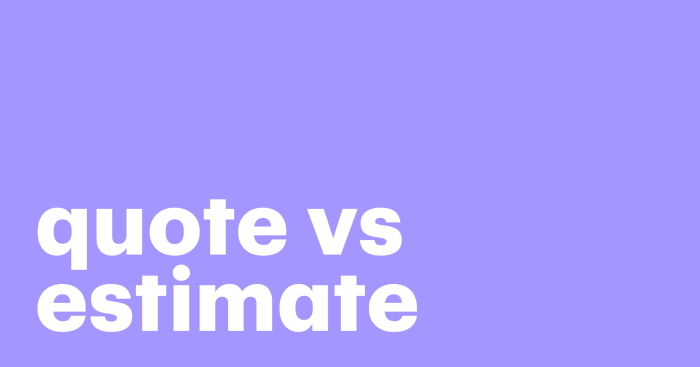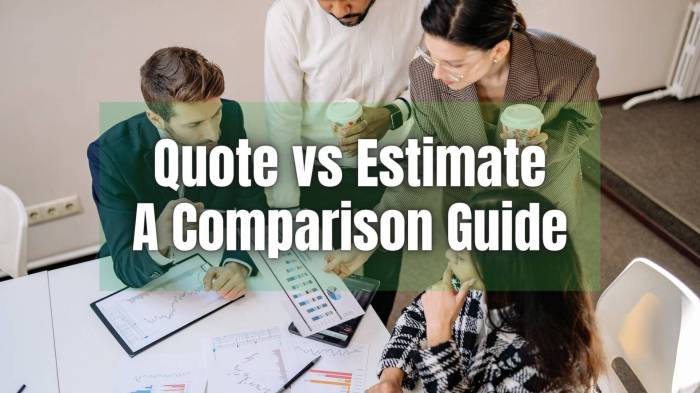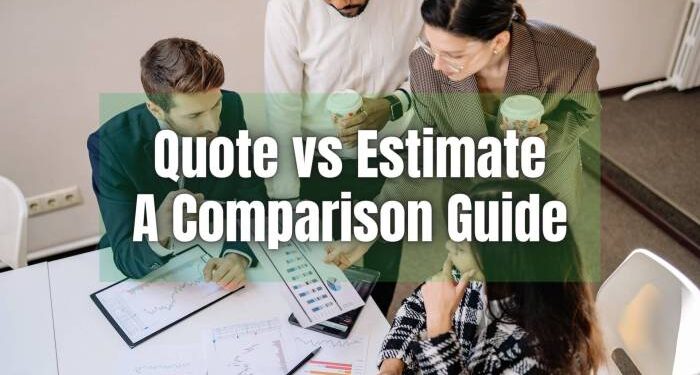Exploring the disparities between Auto Insurance Quotes and Estimates, this introduction sets the stage for an insightful discussion on the nuances of these terms.
Providing a detailed overview of the key concepts, this paragraph aims to captivate readers and generate curiosity about the subject matter.
Understanding Auto Insurance Quote and Estimate
An auto insurance quote is an estimate of the premium you will pay for an insurance policy based on the information you provide to the insurance company. It is a personalized rate that reflects the coverage options you choose, your driving record, the type of vehicle you drive, and other factors.When it comes to an auto insurance estimate, it is a rough calculation of the potential cost of an insurance policy, often provided without a detailed review of your specific information.
Estimates are more generalized and can give you a ballpark figure of what you might expect to pay for coverage.
Differentiating a Quote from an Estimate
- Auto Insurance Quote: A personalized rate based on detailed information provided to the insurance company. It is a more accurate representation of the cost of coverage.
- Auto Insurance Estimate: A rough calculation of potential costs, often given without a thorough review of individual details. It provides a general idea of the cost of insurance.
- Quotes are more precise and tailored to your specific situation, while estimates are more generalized and may not be as accurate.
- Quotes are typically binding, meaning the insurance company is obligated to honor the rate provided, while estimates can change based on further information.
Factors Influencing Auto Insurance Quotes and Estimates

When it comes to auto insurance, there are various factors that insurance companies consider when providing quotes and estimates. These factors play a crucial role in determining the cost of insurance coverage for a vehicle.
Factors Influencing Auto Insurance Quotes
- Driving Record: A clean driving record with no accidents or traffic violations often leads to lower insurance quotes.
- Vehicle Type: The make and model of the vehicle, as well as its age and safety features, can impact the insurance quote.
- Location: Where the vehicle is primarily parked or driven can affect the insurance rate due to factors like crime rates and traffic congestion.
- Coverage Limits: The amount of coverage and types of coverage selected will influence the overall insurance quote.
- Credit Score: In some states, credit history can also be a factor in determining auto insurance quotes.
Factors Influencing Auto Insurance Estimates
- Extent of Damage: When providing an estimate for repairs, the extent of damage to the vehicle is a crucial factor in determining the cost.
- Parts and Labor Costs: The cost of parts and labor required for repairs will impact the overall estimate provided by the insurance company.
- Repair Shop Rates: Different repair shops may have varying labor rates, which can influence the estimate for repairs.
- Insurance Policy Coverage: The coverage limits and types of coverage in the insurance policy will determine the extent to which repairs are covered.
- Deductible: The amount of deductible selected by the policyholder will affect the out-of-pocket expenses associated with the repair estimate.
It is important to note that while quotes are based on predictive factors, estimates are based on actual damage and repair costs.
Accuracy and Reliability of Quotes and Estimates

When it comes to auto insurance, the accuracy of quotes and the reliability of estimates are crucial factors to consider. Let's delve into how these aspects can impact your decision-making process.
Evaluating the Accuracy of Auto Insurance Quotes
- Auto insurance quotes are based on the information provided by the individual seeking coverage. Insurers use this data to calculate the potential risk and cost associated with insuring the driver.
- Factors such as driving history, age, vehicle make and model, and location play a significant role in determining the accuracy of the quote.
- Quotes can vary between insurance companies, so it's essential to compare multiple quotes to ensure you are getting the best deal.
- Inaccuracies in quotes can occur if the information provided is incorrect or incomplete. It's crucial to double-check all details to receive the most accurate quote.
Assessing the Reliability of Auto Insurance Estimates
- Auto insurance estimates are often provided as a rough calculation of potential costs based on limited information.
- Estimates may not always reflect the final premium, as they are subject to change once a more detailed assessment is conducted by the insurance company.
- Reliability of estimates can vary depending on the complexity of the individual's circumstances and the accuracy of the initial information provided.
- It's important to be cautious with estimates and understand that they may not always align with the final cost of insurance.
Examples of Situations Where Quotes or Estimates May Be Inaccurate
- If the individual has a history of traffic violations or accidents that were not disclosed, the quote provided may be lower than the actual premium.
- Estimates may be inaccurate if there are changes in the individual's driving habits or circumstances that were not considered during the initial assessment.
- External factors such as changes in insurance regulations or market trends can also impact the accuracy of quotes and estimates.
- Quotes or estimates provided online without a thorough review of the individual's specific situation may not capture all relevant details, leading to inaccuracies.
Obtaining Auto Insurance Quotes and Estimates
When it comes to obtaining auto insurance quotes and estimates, there are distinct processes involved for each. Understanding how to request these figures can help individuals make informed decisions about their insurance coverage.
Obtaining an Auto Insurance Quote
Getting an auto insurance quote involves reaching out to insurance companies or agents to inquire about the cost of coverage based on specific details provided by the individual. The process typically includes:
- Submitting personal information such as age, driving history, vehicle details, and coverage preferences.
- Receiving a quote based on the information provided, which may vary depending on the insurance company's policies and calculations.
- Comparing quotes from different insurers to find the best coverage and rates that meet individual needs.
Requesting an Auto Insurance Estimate
Requesting an auto insurance estimate is a broader calculation of potential costs based on generalized information provided by the individual. The process involves:
- Providing basic details such as age, location, vehicle make and model, as well as estimated mileage.
- Receiving an estimate of potential insurance costs based on average rates for individuals with similar profiles.
- Using estimates as a rough guide to understand potential insurance expenses without committing to a specific policy.
Comparing the Ease of Obtaining Quotes vs. Estimates
Overall, obtaining auto insurance quotes tends to be more detailed and personalized than requesting estimates. While quotes require specific information and may take longer to generate, they offer a more accurate representation of potential insurance costs. On the other hand, estimates provide a general overview of expenses based on average data, making them quicker and easier to obtain but less tailored to individual circumstances.
Last Point
Concluding our exploration of Auto Insurance Quote vs Estimate: What’s the Difference?, this section encapsulates the core insights and leaves readers with a lasting impression of the topic at hand.
FAQ Compilation
What is the main difference between an Auto Insurance Quote and an Estimate?
An auto insurance quote is a precise offer from an insurer based on specific information provided, while an estimate is a rough calculation that may not be as accurate.
How do factors influence Auto Insurance Quotes and Estimates differently?
Factors like driving history and vehicle details impact quotes directly, while estimates are influenced by general information such as age and location.
Can Auto Insurance Quotes or Estimates be inaccurate?
Yes, both quotes and estimates can be inaccurate, especially if the provided information is not detailed or current.














